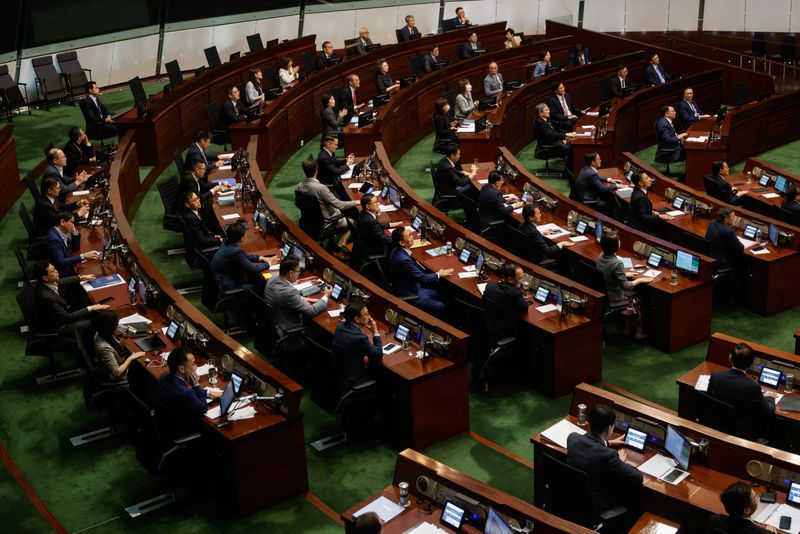By Jessie Pang and Joyce Zhou
HONG KONG (Reuters) -Hong Kong's legislature unanimously voted on Thursday to overhaul district-level elections by drastically reducing the number of directly elected seats, which critics said would further shrink democratic freedom in the Chinese-ruled city.
Under the amendment, only 88 seats would be directly elected by the public, down from 452 in an election that saw a landslide victory for the democracy camp in 2019.
The overall number of seats would also be reduced from 479 to 470. No date has been set for the next election.
The amendment will further stifle the remnants of democratic opposition in the former British colony, where a national security law that China imposed in 2020 has already led to the arrest of former lawmakers and district councillors and the break-up of several political parties.
Candidates who want to run in the next election will have to pass a national security background check and secure at least three nominations from several committees, effectively barring most democracy advocates from running.
"The pro-democracy camp are obviously gone in the election," Lemon Wong, the vice chairperson of Tuen Mun District Council and one of the few remaining democrats, told Reuters.
"I will try my best to enjoy the remaining six months of my career as a councillor, because it would be difficult to have a next time," Wong said.
Following months of anti-government protests in 2019, China imposed the national security law to criminalise what it considers subversion, secessionism, terrorism or collusion with foreign forces with penalties of up to life imprisonment.
Critics say the law is used to stifle dissent in the city that returned to Chinese rule under a "one country, two systems" formula meant to safeguard its freedoms for 50 years.
City authorities and the Beijing government deny cracking down on dissent but say it is vital to preserve the law and order that underpins the financial hub's economic success.
Although Hong Kong's district councils (DC) are mainly focused on community issues, such street sweeping and bus stops, Beijing and Hong Kong authorities say they want to ensure only "patriots" can be elected to them.
The city leader, John Lee, hailed the amendment as an important milestone in improving governance.
"We must plug the institutional loopholes and completely exclude those anti-China and destabilising forces," he said in a statement.
"This legislative exercise implements the principle of 'patriots administering Hong Kong' ... DCs are firmly in the hands of patriots."
China had promised universal suffrage as an ultimate goal for Hong Kong in its mini-constitution, the Basic Law.

A spokesperson for the EU said in a statement that it was calling on "the Chinese and Hong Kong authorities to restore confidence in Hong Kong’s democratic processes, and to pursue the establishment of universal suffrage that is enshrined in the Basic Law".
Pro-democracy politicians won 388 out of 452 district council seats during the last district council election in 2019, taking almost 90% of the seats and humiliating the pro-Beijing camp.